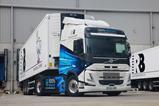European Council endorses ambitious targets to significantly reduce emissions in the heavy-duty transport sector, promoting the adoption of zero-emission vehicles such as hydrogen and electric buses, while raising questions about the use of polluting grey hydrogen.

The European Council has lent its support to a proposal aimed at enforcing substantial emissions reductions within the heavy-duty transport sector, ultimately phasing out fossil fuel-powered vehicles in favor of zero-emissions alternatives, be it Hydrogen or batteries.
The proposal outlines a 45% emissions reduction target for new heavy-duty vehicles, such as trucks and buses sold after 2030, in comparison to 2019 levels. This target is set to increase to 90% by 2040, with an interim goal of 65% by 2035. These targets are subject to review by the European Commission in 2027, taking into account the progress made in establishing charging and refueling infrastructure for zero-emission vehicles (ZEVs).
Exemptions are in place for vehicles that cannot easily transition to zero emissions due to their operational requirements, such as trucks working in mountainous regions or those involved in forestry, agriculture, or mining. These exceptions allow up to 10% of the segment’s carbon emissions to persist in 2040.
The revised legislation, initially proposed by the European Commission in February, imposes strict emissions performance standards on new heavy-duty vehicles sold after 2030 to meet these targets. While the EU has not yet clarified whether it will implement outright bans on polluting vehicles, the responsibility for achieving these targets will be placed at the Union level, relying on data from member states.
Now that the Council has agreed on a general approach, negotiations with the European Parliament will follow. This legislation will not be ratified until all three branches of EU government—the Council, the Commission, and Parliament—reach a consensus.
Although not a direct part of the Fit for 55 package, this regulation is aligned with the EU’s broader goal of reducing emissions by 55% by 2030 and achieving net-zero emissions by 2050.
Teresa Ribera Rodriguez, Spain’s minister for ecological transition, emphasised the importance of the agreement, stating, “With today’s agreement, we have reaffirmed our commitment to reach our ambitious climate targets. Lorries, buses, and coaches are an important part of road transportation, affecting the daily lives of millions of citizens. Citizens deserve to live in a greener and healthier environment, and we are now a step closer toward this objective. At the same time, we are ensuring the competitiveness of the industry by clarifying the roadmap for new investments.”


















